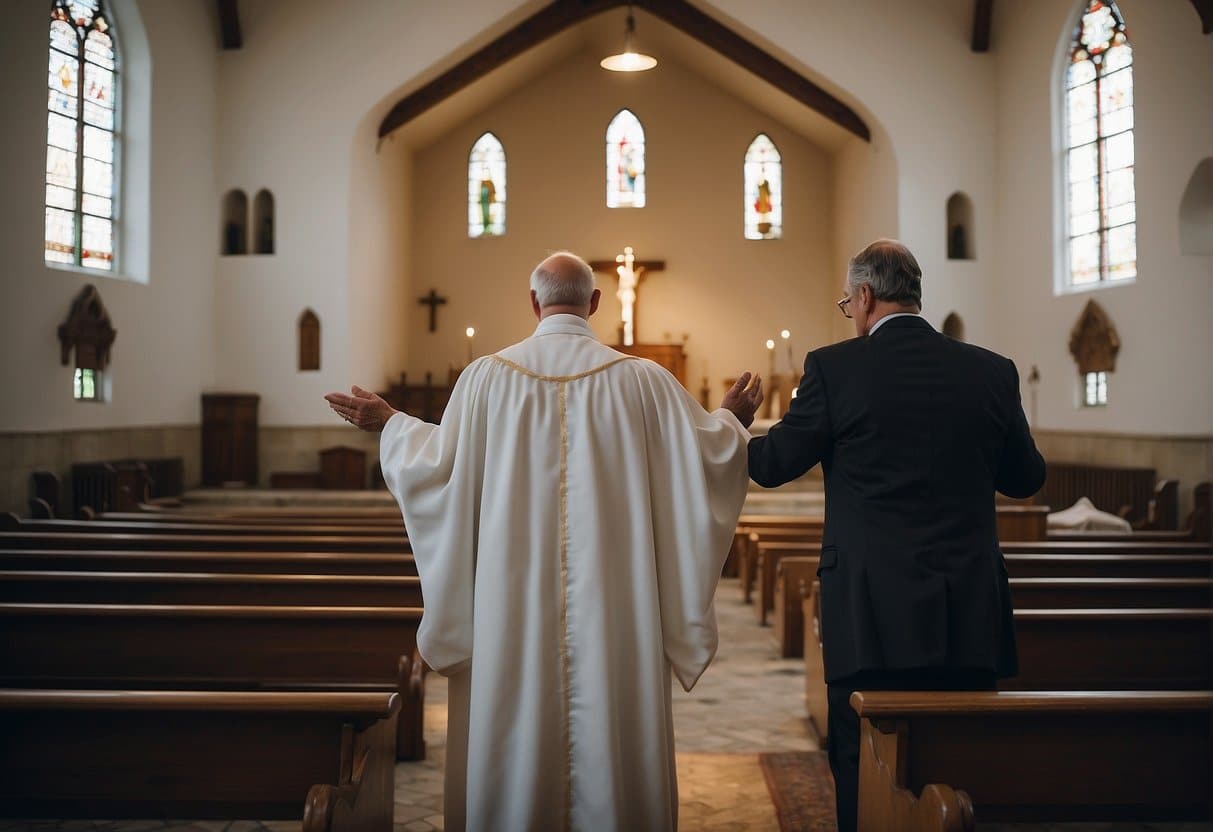If you’re a Protestant, you may be wondering whether you’ll go to heaven. The question of whether will Protestants go to Heaven is a tough one, and the answer depends on a variety of factors.
While there is no one-size-fits-all answer to this question, there are some general principles that can help you understand the issue better.

One of the central tenets of the Protestant faith is salvation by faith alone. This means that Protestants believe that salvation is a gift from God that is received through faith in Jesus Christ.
Protestants do not believe that good works, sacraments, or any other human effort can earn salvation.
Instead, salvation is a gift that is received by faith alone. This belief is based on the teachings of the Bible, particularly the New Testament.
While Protestants believe that salvation is a gift that is received through faith alone, they also believe that faith without works is dead. In other words, genuine faith will always result in good works.
This does not mean that good works are necessary for salvation, but rather that they are an inevitable result of salvation. The Bible teaches that those who have been saved by faith will be known by their fruits, which are good works.
So, while Protestants do not believe that good works can earn salvation, they do believe that good works are important evidence of genuine faith.
Theological Foundations of Protestants and Heaven
Salvation is the deliverance from sin and its consequences, and it is a central tenet of Christianity. Theological foundations of salvation are rooted in the Gospel of Christ and are grounded in Scripture.
There are different perspectives on salvation between the Protestant and Catholic churches, but both agree that salvation is a gift of God.
Protestant Beliefs on Salvation
Protestants believe that salvation is by grace through faith in Jesus Christ alone. They believe that all people are sinners and need salvation.
Protestants believe that salvation is a personal decision made by an individual to accept Jesus Christ as their Lord and Savior.
They believe that salvation cannot be earned through good works or any other means, but is a gift of God’s grace.
Catholic Perspectives on Protestant Salvation
The Catholic Church teaches that salvation is through faith in Jesus Christ and through the sacraments of the Church.
The Church also teaches that those who are not Catholic can be saved if they have faith in Jesus Christ and follow their conscience.
The Catechism of the Catholic Church states that “it is through Christ’s Catholic Church alone, which is the universal help toward salvation, that the fullness of the means of salvation can be obtained” (CCC 816).
Sacraments and Protestantism

Protestantism is a branch of Christianity that emerged from the Reformation in the 16th century.
While Protestantism shares many beliefs with Catholicism, there are some significant differences in sacramental theology.
Baptism and Communion in Protestant Churches
Baptism and communion are two of the most important sacraments in Christianity. In Protestant churches, baptism is typically seen as a symbolic act that represents a person’s commitment to Christ.
It is not seen as a means of grace or a requirement for salvation. Communion, also known as the Eucharist, is seen as a commemoration of Christ’s death and resurrection.
It is not seen as a literal transformation of the bread and wine into the body and blood of Christ, as in Catholicism.
Catholic Sacraments and Protestant Views
Catholicism recognizes seven sacraments: baptism, confirmation, Eucharist, penance, anointing of the sick, holy orders, and matrimony.
Protestantism, on the other hand, recognizes only two sacraments: baptism and communion. Protestants generally reject the idea that sacraments are necessary for salvation and instead emphasize the importance of faith in Christ.
While there are differences in sacramental theology between Protestantism and Catholicism, it is important to note that both traditions share a belief in the importance of baptism and communion.
Protestants may have a different understanding of these sacraments, but they still hold them as central to their faith.
Divergent Views on Afterlife and Heaven

As a Protestant, your beliefs about the afterlife and heaven may differ from those of other Christian denominations.
Here are some of the divergent views on the topic:
Protestant Interpretations of Afterlife
Protestants believe in eternal life, which means that after you die, your soul goes to either heaven or hell.
Protestants believe that heaven is a place of eternal joy and happiness, where you will be reunited with loved ones and live in the presence of God.
You will be judged based on your faith and actions during your life on earth, and only those who have accepted Jesus Christ as their savior will be granted entry into heaven.
Protestants do not believe in purgatory, which is a Catholic doctrine that suggests that after death, some souls go to a temporary place of punishment and purification before entering heaven.
Protestants believe that once you die, your eternal fate is sealed, and there is no second chance or opportunity for redemption.
Catholic Doctrines of Purgatory and Heaven
Catholics believe in the existence of purgatory, which is a temporary state of purification for souls who are not yet ready to enter heaven.
Catholics believe that after death, the soul is judged and assigned to either heaven, hell, or purgatory. Purgatory is seen as a place of temporary suffering, where the soul is cleansed of its sins before being allowed to enter heaven.
Catholics also believe that heaven is a place of eternal joy and happiness, where the soul is reunited with loved ones and lives in the presence of God.
However, Catholics believe that only those who have lived a life of faith and good works will be granted entry into heaven.
Catholics believe that the final judgment will take place on Judgment Day when all souls will be judged based on their faith and actions.
Practices and Actions Affecting Salvation
As a Protestant, your actions and practices play a significant role in determining your salvation. While Protestants believe that salvation comes by faith alone, they also believe that faith without works is dead.
Therefore, it is important to lead a life of good works and charity to show your faith in God.
Role of Good Works and Charity
Protestants believe that good works and charity are essential for salvation. These actions are a reflection of your faith in God and your love for others.
By performing good works and charity, you are demonstrating your commitment to God and your desire to follow in His footsteps. Therefore, it is important to be charitable and perform good work whenever possible.
Confession and Forgiveness in Protestantism
Confession and forgiveness are also important practices in Protestantism. It is important to confess your sins and ask for forgiveness from God. This requires a sincere heart and contrition for your sins.
By confessing your sins and asking for forgiveness, you are acknowledging your mistakes and showing your commitment to living a life of righteousness. Through God’s forgiveness, you can be saved and enter into eternal life.
In summary, your actions and practices play a significant role in determining your salvation as a Protestant.
It is important to lead a life of good works and charity, confess your sins, and ask for forgiveness to demonstrate your faith in God and your commitment to living a life of righteousness.
Interdenominational Relations and Ecumenism
Protestant-Catholic Dialogue
The relationship between Protestants and Catholics has been marked by tensions and disagreements throughout history.
In recent decades, there has been a growing movement towards dialogue and reconciliation between these two Christian denominations.
Protestants and Catholics have different beliefs on various theological issues, such as the role of the Church, the authority of the Bible, and the nature of salvation.
Nevertheless, both groups share a common belief in the Trinity, the divinity of Jesus Christ, and the importance of prayer and worship.
Protestant-Catholic dialogue has focused on finding common ground and understanding on these issues, while also respecting the differences between the two groups.
This dialogue has led to joint statements and agreements on important theological issues, such as the doctrine of justification.
Unity and Diversity Among Christian Denominations
The diversity among Christian denominations can be seen as both a strength and a challenge.
On the one hand, it allows for different expressions of faith and worship and provides opportunities for individuals to find a community that resonates with their beliefs. On the other hand, it can lead to divisions and disagreements and can make it difficult to achieve unity among Christians.
Ecumenism is the movement towards greater unity among Christian denominations. This movement seeks to find common ground and understanding among different groups, while also respecting the diversity of beliefs and practices.
Ecumenical efforts have led to the formation of organizations such as the World Council of Churches, which brings together Christians from different denominations to work towards common goals such as social justice and peace.
Wrap It Up
So, will Protestants go to Heaven? While there are differences in beliefs and practices among Christian denominations, there are also opportunities for dialogue and reconciliation.
The movement towards ecumenism and greater unity among Christians can help to strengthen the Church and promote understanding and cooperation among different groups.
